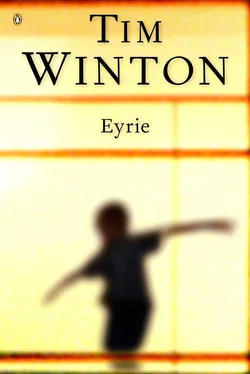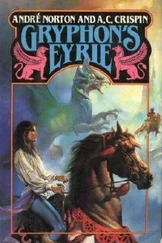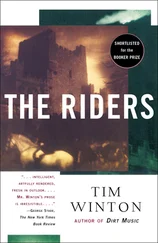It was only a matter of weeks before you could feel the first troubling currents of resistance from the pews. And it came so quickly, that awful Sunday evening when the string-lipped elders froze Nev out, cast him off, sent him packing with his dirty commo outrage to all that was sacred and true. After which, though the times were a-changing, no mainstream outfit would have him. So followed a period when Doris and Nev ran house churches and drop-in centres that were warm and anarchic and better suited to all the Keelys’ gifts and temperaments, and it felt, in retrospect, like the sweetest time for all four of them. Just a few good and happy years before the biker church rumbled into town and everything went sour.
They were a glamorous, sinister outfit, those Harley-riding holy rollers, and their local chapter only lasted a year, but for a few months Neville Keely was their front man, their bighearted dupe. Revvin Nev, riding high, open throttle, steering Christ’s hog down the highway, imploring easy riders not to blow it. Never knowing what he’d signed up to, how the power was distributed. And it was painful for Keely, recalling how fast his adoration had curdled. All through his boyhood the old man had been a moral, physical giant who only grew in stature. He was Christ’s own viking, all love and thunder. And then, at the cusp of Keely’s adolescence, once this biker thing took hold, his father suddenly looked like another goofy old fart on a Triumph spouting peace, love and understanding. It was Keely’s guilty secret, this creeping shame, relieved only by Nev’s complete humiliation when those octane Jesus freaks turfed him out on his arse and began legal proceedings against him. Nev had discovered and then robustly challenged the bikers’ impervious conviction that they were British Israelites, and must be, therefore, a whites-only outfit. He’d signed stuff he hadn’t even read, heard arcane wafflings he hadn’t bothered to take in. And he didn’t understand that he was dealing with a corporation as much as a church. He fought on like a man who believed justice would prevail. And they ground him down until he’d mortgaged half the house to pay the legal fees. He never surrendered. But he wore himself into a ruin. Keely remembered him in a cane chair beneath the almond tree, praying, weeping, his beard full of crumbs. Soon afterwards the heart attack carted him off. And they were alone, his mother, his sister and him, in debt, bewildered.
A good man, his father, but not always smart. It was only when he was gone that Christ’s puzzling injunction to be as wise as serpents and innocent as doves began to make brutal sense. Indeed it became a rueful family motto. To which Doris and Faith had been trying to return Keely’s attention for several years. And they were right. In both marriage and work he’d become more angry than effective, more impatient than observant and more honest than useful. Wal saw him as a chip off the old block. And maybe Gemma did too. But he was just not that man.
Silent and backlit, the boy stood in the doorway. He was no more substantial than a blur. The minute he ghosted into the frame, filling the space with his peculiar static energy, something about this lack of resolution caused Keely’s hackles to rise, as if some unknowable danger hung in the supercharged air about the boy. Keely snapped upright in the kitchen chair, awake now but unsettled. He’d dozed off right there, sunburnt as a ten-pound Pom. Leaving the door open like that. An open invitation to chaos. A week ago he’d never have been so lax.
But it was only him. If indeed he was awake. And if the blur in the doorway was only a child.
He waited for Kai to speak. But the only sounds pouring into the flat were car horns and wattlebirds. A tiny jet of panic. Sudden irrational fear.
Kai?
Keely leapt to his feet. The suddenness of it set off a thud in his head. He was truly awake. He approached the screen door.
Only a boy. Flushed in the face and barefoot. In the ugly littleshorts and stretchy polo shirt that passed for school uniform these days. His helmet of hair, fine and fair, riffled in the breeze.
The boy gazed impassively at a point just past Keely’s hip.
So, said Keely, clawing back some calm. How’s school?
Good.
Well. That’s good.
Nan said you’re comin tonight. For tea.
Oh, said Keely. Am I?
The boy pressed his hand against the insect screen and it puckered his flesh in rigid patterns.
Alright, said Keely like a man hypnotized. What time?
Tea time.
Well, he said, recovering a moment. That seems fair. You want to come in for a sec?
I’ve been here before.
Oh. When?
I was stuck, said Kai.
In here?
No words, said the boy in a strange, flat tone. Things didn’t work. I wasn’t feeling right. Something had to take me.
Keely peered at the kid. None of what he’d said made any sense. And the child’s delivery made it queerer still. Kai looked past him, and then a moment later directly at him, only it felt to Keely as if he were looking straight through him, and it rankled.
Just run that by me again, he said, lowering himself to Kai’s eye level.
But the kid backed away.
Kai?
He was gone. Seconds later Keely heard the clack of the door along the way.
*
Gemma’s place was smoky and cluttered — a couch, a big TV, some posters on the wall, a potted ficus by the slider, a midden of washed laundry on the coffee table. The layout was identical to his, but her flat felt homelier, more lived-in.
She looked pretty in her denim skirt and sleeveless top, but she was subdued. On the tiny kitchen table Kai had a book on raptors open at a picture and description of the brahminy kite.
He haunts that library, said Gemma, setting some chops into a pan.
I was the same, said Keely, taking in the third chair pulled up to the table.
Don’t worry, I remember. Always had your face in a book.
No wonder I never noticed anything, eh?
You want a beer? she said as if she hadn’t heard him.
Nah. But you go ahead.
Can’t, she said. I’m workin tonight.
The boy seemed content to leaf through his book undisturbed. Keely watched Gemma cook the meal briskly, without flourish or fuss. He didn’t quite know where to sit or stand, what the evening was about, how he was placed, but he was glad of the invitation, appreciated the brief sense of propulsion it afforded him, and there was something lovely in the domestic fug of this flat: a woman, a child, food being prepared. This was the life functional people lived and he had to guard against it setting things off in him he couldn’t manage. He was nervous. About her more than anything.
He leant against the bench savouring the curve of her butt in its denim skirt. Impersonating a man at his ease.
When the food was ready Gemma set the plates down unceremoniously and they sat, the three of them, around the scuffed little table. Keely made too much of the lamb chops, the mash and the peas. Gemma suffered his praise and directed him to shut up and eat and so they ate shyly, silent but for the low mumbling TV, the burp of the sauce bottle and the scrape of cutlery. The meal was like something from Blackboy Crescent: the three colours on the plate, the dull sheen of laminex, the mist of sheep fat in the hot evening air.
Keely couldn’t help but observe Kai. The boy segmented his food with precision, aligned it on the plate by size and category, and chewed gravely, consuming his meal with the unhurried method of a lonely spinster, and it was only when he addressed the wicked finger of fat on his chop that he became, in Keely’s eyes, a child in whom he could see himself, a kid — avid, exultant. He tried not to smile, lest it disrupt the boy’s hermitic concentration. The adenoidal snuffle, the hunched wings of his shoulders. Here, surely, was a kid without friends, a boy who was an island of self-possession. He was peculiar. Compelling in a way.
Читать дальше












